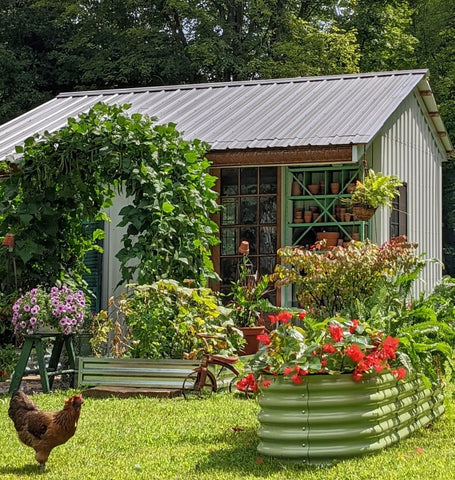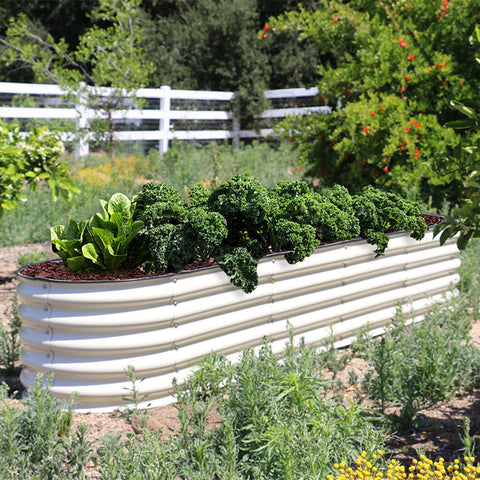Raised Garden Bed Gardening: Pest Management
How to protect your raised garden bed from pests? Harmful pests and insects can be prevented before they become a problem. You need to identify the most common and destructive pests in your garden and ensure that your plants are protected from this nuisance.
The garden space is small and closed, so it is easy to place pests in the raised garden bed! The following tips will help keep unwanted small animals and invasive plants away from precious crops in the raised garden bed.
Common garden pests
- Aphids
- Slugs
- Pumpkin worm
- Pumpkin rattan moth
- Japanese beetle
- Tomato hornworm
- Worms
- Slugs and snails
- Caterpillar
- Flea beetles
- Cod moth
- Thrips
- Pink scale
- Rattan weevil
- Leaf miners
Of all garden pests, slugs and aphids are the most common. But these can be easily remedied by paying close attention to them. Pumpkin insects and pumpkin vine borers eat any type of pumpkin, so planting resistant pumpkin varieties is a way to prevent these pests. Japanese beetles are common, but they are easy to find. The same is true of tomato hornworms and hornworms.
Stop pests on raised garden beds
Raised garden beds do not magically deter pests. No structure or product can completely and permanently eliminate pests. However, the raised design of the raised garden bed makes it easy to access plants, so maintaining plants becomes easier to manage! Here are some gardening tips for eradicating unwanted pests:
Check for infection: The best way to deal with pests is to monitor the intrusion of the raised garden bed garden. Always check for insect eggs under the leaves and destroy them before they hatch. Dead head or pinching off diseased plants or leaves. During periodic inspections, be aware of discolored or damaged leaves.
Proper covering: Proper covering can minimize the risk of infection. If pests see that the environment is not suitable for life, they will move to other places. For example, the use of cedar and cypress bark as mulch can help drive out different kinds of gnawing insects. However, please note that some wood coverings may attract destructive insects such as wood ants, ear twigs, cockroaches and termites, so not all types of wood should be used as garden coverings. The bark of cedar and cypress contains oil and chemicals, which can naturally prevent pests. Cedar and cypress coverings also take a long time to decompose, so you don't need to replace them often.
Introduce some new soldiers: the intelligent defense against pests makes them prey for small animals that are predatory but friendly to the garden! Planting certain plants will attract beneficial insects, such as ladybugs, lacy insects, mantis and predatory wasps. Ladybugs feed on aphids, while lacy insects feed on caterpillars and aphids. Mantis likes moths, beetles and flies, while parasitic wasps can destroy the eggs of pests! Ground beetles, lizards, and toads like most kinds of slugs.
Water properly: You need to water plants regularly to keep healthy, but pay attention to excessive water. Proper watering is essential, but ponding should be avoided at all costs, as it will attract different pests and diseases.
Companion planting: Planting complementary plants side by side with crops can help avoid pests. Dill, fennel, parsley, yarrow, basil, catmint, citronella, mint and lemongrass are natural deterrents of common garden pests, including stubborn aphids and potato beetles. As an added benefit, most of these aromatic plants can attract predatory insects, which will further strengthen your garden's defense against pests!
Diatomite: Diatomite is a powder made from fossil remains of aquatic organisms called diatoms. It is environmentally friendly and non-toxic, so it is used to prevent garden pests. The powder is rather coarse. When insects contact diatomite, their exoskeletons are damaged, and they will dehydrate to death. Just sprinkle a layer of even diatomite on the soil to keep the annoying pests away from the crops.
Install physical barriers: physical barriers such as plant coverings, row coverings, and fabric coverings help protect plants from adverse weather conditions and pests. Remove the lid only when the crop is in bloom, so that pollinating insects can touch the flowers.
Try intercropping: planting the same plant next to each other will make the crops vulnerable to pests. Mixing different plants throughout the region will make it difficult for pests to reach the plants they want to eat.
Homemade pesticides: Some of the most effective pest deterrents are found in the kitchen. Garlic, neem oil, vegetable oil, pepper powder, baking soda, biodegradable detergent and essential oil are just some of the natural ingredients that can be used to eliminate garden pests. Just mix an appropriate amount of natural pest deterrent with water in the spray bottle and spray!
As you can see, there are many techniques to prevent pests and avoid chemical pesticides. Chemical pesticides are treated equally; These products will kill beneficial organisms and pests. Taking an all natural route will be healthier for you, your crops and the environment.
More about controlling pests in raised garden beds
Although planting crops on the raised garden bed will create miracles and keep pests away from your plants, if you do not maintain your garden frequently enough, destructive small animals can infiltrate every garden.
Carefully check your garden for pests as often as possible and remove any pests you see by hand. Do not use chemical pesticides, as these chemicals will kill beneficial organisms and pests. In addition, chemicals may seep into the soil and eventually into your plate!
Watering must be careful to avoid water accumulation. Pests like wet soil, especially centipedes, ear silkworms, shellfish and cockroaches. Water only when the soil feels dry. Use well drained soil. Maybe install an irrigation system to control water.
Be creative in crop arrangement. Try intercropping or learn more about partner planting will also make your garden less vulnerable to eating and burrowing pests.
Have you ever tried to use a raised garden bed before? This is one of our favorite ways to control pests and grow healthy crops throughout the season! Instead of building a raised garden bed from scratch, we have fully assembled raised garden beds of different designs to meet your needs.


